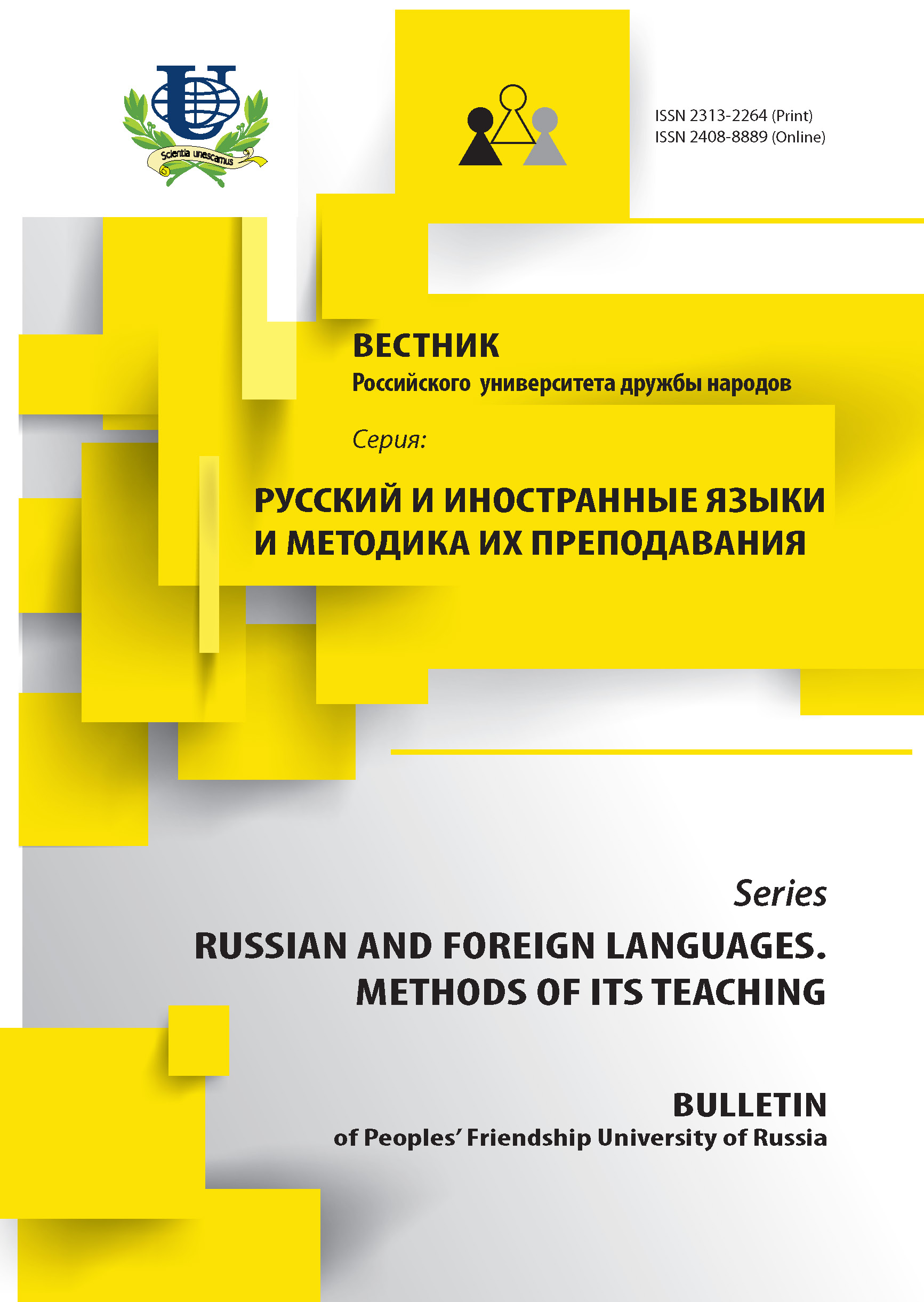No 4 (2009)
- Year: 2009
- Articles: 20
- URL: https://journals.rudn.ru/russian-language-studies/issue/view/611
Articles
80 anniversary from the date of V.G. Kostomarov's birth and about its book «Speech on text Forms in Dialogue»
Russian Language Studies. 2009;(4):5-10
 5-10
5-10


Linguadidactic aspect of the methodics of teaching russian as foreign language and ways of its studying
Abstract
The article describes one of the major directions of studying of the linguadidactics, which makes a scientific basis of a technique of training Russian as foreign language. The differentiated approach to traditional concepts is offered: contact of native & studying languages, use of a comparative method, types of interference.
Russian Language Studies. 2009;(4):11-16
 11-16
11-16


Grammatical links in russian texts of public statements of officials of Tajikistan
Abstract
In article it is shown that there are numerous means of semantic and formal connection of statements in texts of public statements. A communication facility of offers in written texts, in particular is most studied? In texts of business communications.
Russian Language Studies. 2009;(4):17-23
 17-23
17-23


 24-32
24-32


 33-38
33-38


Rhetorical question in groups of indirect speech acts
Abstract
The article deals with the structural-semantic and functional peculiarities of the rhetoric question, which distinguish it from other indirect speech acts with the illocutionary force of message. The research is carried out using Russian National Corpus materials.
Russian Language Studies. 2009;(4):39-45
 39-45
39-45


 46-51
46-51


Tautanim as a way of demonstrating ambivalence of the character's nature
Abstract
The scientific article is devoted to the analysis of the duplicated name Gumbert in the novel of Nabokov «Lolita». The urgency of clause is caused by research of language of V. Nabokov and defined by search of new approaches to studying special style the writer - application of the general theory of a nomination and of the theory narratology for the analysis of the functional and aesthetic importance of nominations in the text of the novel of V. Nabokov «Lolita».
Russian Language Studies. 2009;(4):52-56
 52-56
52-56


 57-63
57-63


Developing intercultural communicative competence through culture specific communicative style
Abstract
The article deals with the problem of language and culture transfer which follows the process of intercultural communication and impedes understanding. It suggests that teaching communicative style which is shaped by cultural differences, communicative values, and politeness strategies helps students of the second language to understand the target culture and its people, to overcome ethnocentrism and negative stereotyping, to adapt their communicative bahaviour to a new culture and as a result to develop their intercultural communicative competence.
Russian Language Studies. 2009;(4):64-73
 64-73
64-73


 74-79
74-79


 80-85
80-85


The experience of computer technologies application in practice of foreign students training in russian oral speech
Abstract
The article is devoted to application of the computer training program «Russian without accent» at training students-foreigners in Russian oral speech. The results of application of this program and principles of creation of a new computer training course are discussed.
Russian Language Studies. 2009;(4):86-92
 86-92
86-92


Methods of work on russian word at audiovisual classes in russian as a foreign language
Abstract
In this article a possibility of work with expressive means of language at audio-visual class is present. According to the principle of cultural orientation in education cinema and tv-materials as reproduction of Russian culture, including speech behavior culture are given.
Russian Language Studies. 2009;(4):93-99
 93-99
93-99


Opinion about a series of interactive video DVD of disks «Miracle-little-one the lessons of reading» and «Miracle-little-one «you learn as in the fairy tale»
Russian Language Studies. 2009;(4):100-101
 100-101
100-101


«Za shelomyanem esi...»
Russian Language Studies. 2009;(4):102-104
 102-104
102-104


Review. Sternin I.A. The selected works. Theoretical and applied problems of linguistics / Scientific ed. Z.D. Popova. - Voronezh: «Sources», 2008. - 596 p.
Russian Language Studies. 2009;(4):105-106
 105-106
105-106


Review of «Encyclopaedic dictionary of biblical phraseologisms», the author of K.N. Dubrovina. - Moscow: «Flint. Science», 2010.
Russian Language Studies. 2009;(4):107-109
 107-109
107-109


Annotatsiya: Larina T.V. Kategoriya vezhlivosti i stil' kommunikatsii: sopostavlenie angliyskikh i russkikh lingvokul'turnykh traditsiy
Russian Language Studies. 2009;(4):110-112
 110-112
110-112


Our Autors
Russian Language Studies. 2009;(4):113-114
 113-114
113-114















